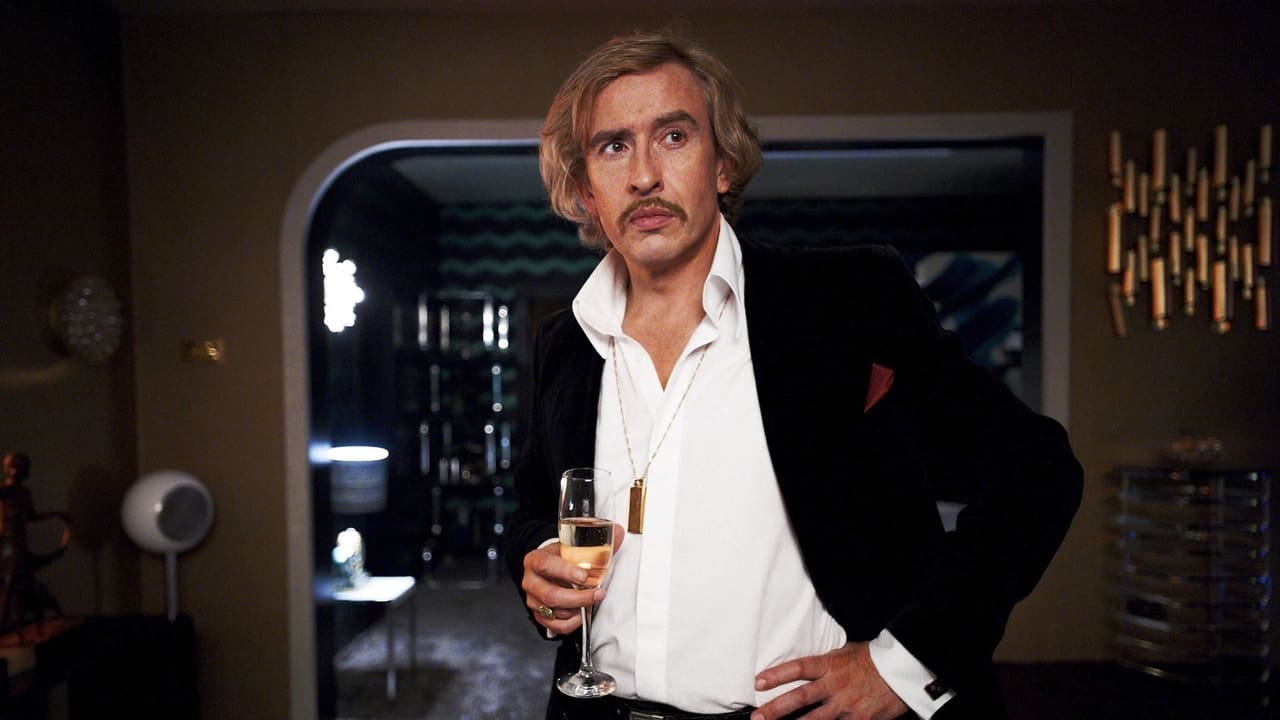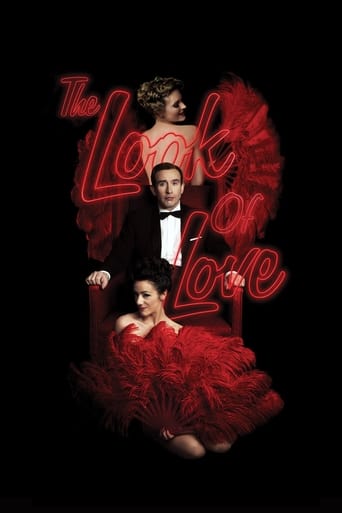



I like the storyline of this show,it attract me so much
View Morejust watch it!
it is the rare 'crazy' movie that actually has something to say.
View MoreThis is a dark and sometimes deeply uncomfortable drama
View MoreRecounting the life of porn king and entrepreneur Paul Raymond, THE LOOK OF LOVE tells the story of a self-made man, born Geoffrey Quinn, who rose to become Britain's richest man. He achieved this by buying innumerable properties and setting up a porn empire that at its height included the Raymond Revuebar, the Windmill Theatre, the Whitehall Theatre, plus two best-selling magazines, "Men Only" and "Club International." Despite such success, Raymond - as characterized by Steve Coogan - remained a fundamentally unhappy man. Obsessed with the idea of proving his virility, he spent most of his time bedding young women as well as taking vicarious pleasure in watching women perform various sex acts on stage. Although his daughter Debbie (Imogen Poots) was devoted to him, Raymond remained indifferent to her - unless, that is, she could make more money for him, He cast her in an ill-starred revue, "Royalty Follies," in a leading role for which she was completely unsuited. The only time Raymond actually missed her was at her death due to a drug overdose. Michael Winterbottom's film makes no judgment on Raymond, but nonetheless suggests the emptiness of the world he created - neither titillating nor sexy, it simply treated women as objects. The film does a brilliant job of recreating the seedy Soho world of the Sixties and Seventies, with its grimy streets and tatty shops. Steve Coogan does a wonderful job in the leading role; he is proving to be a talented performer in a variety of vehicles. THE LOOK OF LOVE contains a gallery of cameo roles from British comedians, including Stephen Fry, Matt Lucas, David Wallians and Miles Jupp; but its story remains a fundamentally melancholy one to tell.
View Morethis is a movie filled up with event and facts but no characters, no detail on characters' world, they are acting on the surface, the script is the problem, it should be worked into textures and layers of these colourful characters rather than just covered them with events and what's happen, they could edit some scenes out which director just show what's happen but not take them further to a better storytelling; stories happened to build the characters so we viewers can sympathize with them. You don't feel for any of the characters here. it's such a shame. this movie has no angle to this special group of people.....All the emotion is not quite there, never gets to the point and ends at the surfaces. the film wasted these casting since they can do more than what's in the film. We all know how well they can act for such a colourful Raymond's world.
View MoreSTAR RATING: ***** Saturday Night **** Friday Night *** Friday Morning ** Sunday Night * Monday MorningIn their latest collaboration, Michael Winterbottom and Steve Coogan explore the world of Paul Raymond, the visionary porn producer who was one of the pioneering forces that transformed London's Soho in to an erotic industry, bringing live shows to the forefront and launching the iconic Men's Only magazine, which eventually saw him become the richest man in Britain. But it also fueled his self destructive edge, finishing his marriage to Jean (Anna Friel), the mother of his children, and leaving her for forthright starlet Fiona (Tamsin Egerton), while leading his daughter Debbie (Imogen Poots) into a world of drug fueled self destruction.Coogan and Winterbottom are the forces behind a series of works that are anti mainstream but still have the star power to appeal to a fairly wide audience, if not commercially, then critically. Having explored the life of Tony Wilson, the founder of Factory Records and an attempt by two men to produce the work of Tristram Shandy, here they have equally meaty subject matter in the shape of Paul Raymond, one of the key figures in the now massive porn industry, but this time around, there seems to be more of a real dramatic input than one driven for laughs. This is a gambit that hardly fails to pay off, really drawing and absorbing you in to the world of Raymond, even if it does maybe trail off a little in places.A wide array of comic talent are on hand in supporting roles and making cameos, from Little Britain stelwarts Matt Lucas and David Walliams, to the likes of Chris Addison in a key role as an egocentric, coke fueled pornographer, to Stephen Fry and even Simon Bird. But as I said, comedy doesn't seem to be the order of the day, so all this seems bizarrely redundant. Coogan fits the lead role perfectly, embodying his real life character with the larger than real life personality and character traits he had, while a naturally attractive female supporting cast adorn other key roles.Lacking the dynamism and effortless energy of 24 Hour Party People, but at least not full of the pretentious self indulgence of A Cock and Bull Story, The Look of Love doesn't quite manage to set the screen alight, but still leaves your senses and emotions on a string. ***
View MoreMichael Winterbottom's The Look of Love is a comedy-drama that never needed to be funny. The film is above all else a tragedy about how a man's wealth and his real estate empire clouded his judgment in all of his relationships. He earned his wealth through establishing his Revue Bars in Soho, the West End of London during the late 1950s. These bars featured nude female models, who were allowed to move on stage, which was deemed illegal at the time.Raymond then established his Men's Only magazine, which was a pornographic publication. His rise in wealth and property through the 60s and 70s led for him to be titled by the mid-90s as "The King of Soho". Paul Raymond was declared in 1992 to be one of the richest men in Britain. He died in 2008 with a fortune that was said to be worth over six-hundred million dollars. This is the fourth film Winterbottom has made with Steve Coogan, after Tristram Shandy: A Cock and Bull Story, The Trip and 24 Hour Party People. Coogan specialises in playing shallow, self-absorbed, stuffy characters. His performance as Raymond is familiar but extremely engaging and darkly funny. Accompanied by some hilariously silly innuendo-laden dialogue, he uses his voice to express the pompousness and artificialness of Raymond's self-made identity. He values his wealth and celebrity image over sustained relationships. One of the stories he repeats is that his apartment was designed by Ringo Starr. A tracking shot as he walks through the room shows the sustained but untouched and unfulfilled construct of his lifestyle. In the context of censorship laws, the incredibly frank and confronting stage shows have a historical resonance, which is further complimented by their utter ridiculousness. Some of Raymond's stage ideas, like combing Genghis Khan and Attila the Hun on stage with nude female models, are strange and hilarious. Yet Paul Raymond is also in many ways a terrible man. His wife Jean (Anna Friel) willingly lets him cheat on her and he relates to his daughter Debbie (Imogen Poots), not through ordinary parental wisdom, but the advice of a business partner. When she eats all of the cakes he buys for her, he tells her that they're not all for her but for the other girls so that she'll have friends. Similarly, when she cries about being cut from one his shows as a singer he doesn't reassure her about future but argues that he can't let the show keep bleeding money. What the screenplay from first time writer Matt Greenhalgh lacks is a deeper understanding of both the reactions and the immobility of the characters. The film is about Raymond's relationships with three different women and despite all of the ones that he sleeps with, works with and exploits, he understands none of them. Rather unintentionally, the film is like this too.The female characters contradict themselves in confusing ways. His first wife knows about his affairs but is still surprised and upset when he finally leaves her. His mistress Fiona (Tamsin Egerton) is no fool either. She writes for his magazine and models in his shows. She engages with him and other women in acts of threesomes but leaves him when he can't offer a normal life. The film is extremely alert to Raymond letting his own daughter fatally self-destruct through her cocaine addiction (he advises her to buy the good stuff) but at the end the film still makes an attempt to reach for our undeserving sympathy. The image of the supposedly talentless daughter singing beautifully over the end credits is also a confusing one. If the film was not told through such a rigid, episodic structure, treating the lives of characters like small vignettes (cancer, marriage and addiction), there would have been stronger ongoing threads of conflict and more time invested into understanding these characters. Some of them are truly sadder than funny.
View More